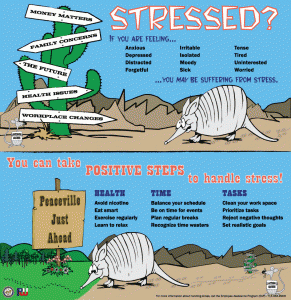
Photo © 2009 disenoterapia CC BY-NC-ND 2.0
Click here for original image.
As you may remember, after the NOKWID project several years ago, I crashed, hard, spent several months deep in depression. And I just now finally feel like I’ve climbed out of that hole, a hole I had ironically dug for myself.
I felt forever tired, forever useless, forever a burden on my family. Nothing gave me pleasure, no joy, no motivation, and I didn’t care. At one point, I even contemplated what steps I would need to take in order to make a strategic exit from this life. (Fortunately, there were too many steps, too complicated.) Oy vey! It makes sense that a demoralizing job might get me down. But that’s supposed to be temporary, not life-destroying.
Then, through the work of Joe Griffin and Ivan Tyrrell, I found I could take steps toward rediscovering the joy and motivation I had lost from my life.

Employee-awareness poster for the City of Houston Public Works Department
Click here for original image.
I love the advice Dave Ramsey gave to one woman caller on a recent episode of his radio show (June 28, 2012, after the 1:45 break). Her husband had been laid off and had lost all drive even to look for work. And every time she brought up the subject, she felt like he just threw it back in her face, because he really couldn’t care less, because he’d lost his hope. Dave’s advice to him: (1) turn off the TV; (2) get up early, exercise, shower, and get dressed, every day; (3) read something encouraging every day; (4) read something about his business or industry every day.
Profound.
Not the view you might have had of depression. And in that spirit, here are a number of myths people have regarding depression:
-
“There’s nothing you can do in the short term to combat depression.” The truth: Almost anything you do in the short term will combat depression. The first thing you can do is to turn off the TV. Now, I love TV, and I even recommend that good writers should watch TV. But television is one of the worst things for a depressed person, because you have sights, and scene changes, and sounds, and melodrama, all pinging you constantly; it’s emotionally exhausting. If you want to combat depression, turn off the TV and instead turn on soothing music, go for a walk (even just around the yard), or read an uplifting or idea-generating book.
-
“A depressed person’s brain has shut down, become unresponsive.” The truth: From the outside, it may appear that way. But inside, he’s more active than ever. Depressed people spend massive amounts of emotional energy dwelling on problems they think they can’t control, until those problems become larger and more important than life itself. Depression is not tired; it is worried.
-
“Depressed people don’t care about anything.” The truth: There is one thing a depressed person does care about, and more than anything else in the world, himself. Depression is selfish, because a depressed person has dwelt on his own perceptions of his own problems until those problems are all that exists in his universe. This is why depression sees life in extremes, blacks and whites, with no shades of grey. Everything is either rosy perfect, or else the universe is falling apart. No in-between. No mixed bag of good and bad. No temporary situations with better times just around the corner. No wonder the poor buggers go crazy.
-
“Depression, like mental illness, indicates that something is broken in your brain.” The truth: A neurological disorder can cause depression— And I don’t want to trivialize the importance of that possibility, because it even happened to a friend of mine. (I even had symptoms similar to his.) However, most depression is simply a warning sign that something is not right in your life. There’s nothing broken about a depressed person. Rather, depression is his reaction to a broken situation in his life. This is why hope is the antidote to depression, because hope sees a way out, or a possible alternative that avoids the problem altogether. Hope sees the shades of grey in the current situation, and sees the rainbow over on the other side of the mountain.
-
“Once depressed, always depressed.” The truth: Depression is not something you are, it’s something you experience. It’s a cloud that comes over you sometimes, and sometimes you may even have to give yourself permission to feel depressed, just for a little while. It will pass. Don’t let it define your existence.
-
“It’s a disease, like alcoholism.” The truth: Neither alcoholism nor depression are diseases. Diseases are caused by viruses, bacteria, chemicals, radiation, and the like. And while there may be cases in which a true physiological problem causes depression, most depression is psychological, not physiological. (But please, do talk to your doctor and rule out the physiological possibility!) Similarly, even though some of us, either through our DNA or our upbringing, are prone to depression, none of us must let depression define us. You don’t “have” depression; you simply feel depressed. It will pass. Don’t let it define your existence.
Unfortunately, these myths are sometimes even propagated by psychologists.
If I have a toothache, I go to the dentist. And he tells me, “Okay, now, here’s what we’re going to do. I need you to come in every week, and every week I’m going to bang on your sore tooth for an hour with this hammer.” And he shows me the hammer. “But don’t expect any improvement until at least 3 to 6 months of treatment.” And at this point, I’m thinking it’s time to find a different dentist.
But I’ve heard of people accepting that answer from their psychologist, because they don’t know any better. And they sit hour after hour, spewing their emotional crap all over the floor, and then rolling around in it, and then everyone is amazed that they don’t feel any better. Now, I am not a psychologist, but I have wrestled with depression, and I can tell you, I would not be amazed. Fortunately, psychologists know more about depression now than they used to, and they’re learning more about the human mind every year.
The most important thing to know is not to lose hope, because hope is the antidote to depression.
-TimK